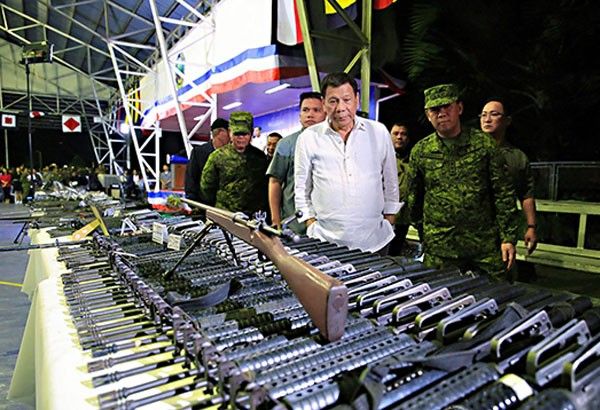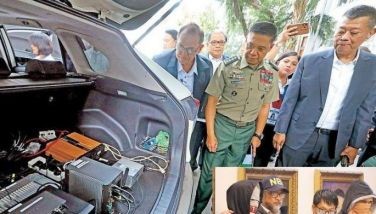OPAPP: New panel to oversee localized 'peace engagements' with Reds

MANILA, Philippines — The dissolution of the government negotiating panel in peace talks with communist rebels is meant to pave the way for a new one that will pursue localized peace negotiations, the Office of the Presidential Adviser on the Peace Process said Wednesday night.
Executive Secretary Salvador Medialdea, in letters signed on March 18, informed members of the peace panel that has been negotiating with the Communist Party of the Philippines-New People's Army through the National Democratic Front of the Philippines that their appointments have been terminated by order of President Rodrigo Duterte.
The termination of the appointments was effective immediately and directed panel members to turn over all documents, papers and properties to the "Office of the Presidential Adviser on Peace, Reconciliation and Unity", according to a report on state-run PNA.
Peace adviser Carlito Galvez Jr. took his oath as "presidential adviser on peace, reconciliation, and unity" in January although the agency he heads is still called the OPAPP.
"The discontinuance of the services of the members of the [Government of the Republic of the Philippines] panel is in line with the termination of peace talks with the NDFP. But we will reconstitute the panel at a national scope in accordance with the whole-of-nation approach we are advocating to achieve inclusive and sustainable peace," Galvez said Wednesday night.
Previous agreements suspended
He added that the government has suspended recognition of previous agreements with the CPP-NPA-NDFP pending a review by the president.
He specifically said that the "the Hague Joint Declaration and Comprehensive Agreement for the Respect of Human Rights and International Humanitarian Laws" have been suspended.
The 1992 Hague Joint Declaration is the framework of the formal peace talks, which the government and the NDFP said then "must be in accordance with mutually acceptable principles, including national sovereignty, democracy and social justice."
The joint declaration also holds that "no precondition shall be made to negate the inherent character and purpose of the peace negotiations."
Under CARHRIHL, which was signed in 1998, the government and the NDFP committed to "uphold, protect and promote the full scope of human rights, including civil, political, economic, social and cultural rights."
Galvez, who was chief of staff of the Armed Forces of the Philippines before being designated peace adviser, said that "for 32 years, we didn’t gain anything from the talks" through the NDFP.
He said the talks are "being used by the CPP-NPA as a leverage for them to strengthen their forces and take advantage of the sincerity of the government."
Localized peace talks
The government has opted to pursue localized peace talks with communist rebels instead of through the NDFP.
Jesus Dureza, who resigned as peace adviser in November, said that month that localized peace talks meant helping "those who want to leave and want to have a peaceful life."
He said then that the government has the Expanded Comprehensive Local Integration Program, which includes housing programs and cash incentives for former rebels to turn in their weapons.
He said although the program has existed in previous administrations, "there is (now) more extensive work in that direction."
Galvez on Wednesday said the localized "peace engagements" will require more participation by local government units.
"OPAPP and other national government agencies will pour in its resources in support of our local chief executives and local peace bodies in their facilitation of their engagements and interventions," he said.
The CPP has rejected the localized talks, saying issues like landlessness and poverty that prompted rebels to take up arms against the government need to be addressed through socio-economic reforms.
RELATED: Cordillera rebels reject 'localized' peace talks
Peace talks under Duterte
Duterte, who had said during his presidential campaign that he would be "the first president from the Left," restarted peace talks with the communist rebels in 2016.
Negotiations began to break down in early 2017 as the NPA announced the cancellation of a ceasefire over what it said was the occupation of hundreds of rebel-held barrios by security forces and the failure to release more political prisoners as they said had been promised.
READ: A year of fighting and talking
In July of that year, Duterte told government peace negotiatiors to no longer pursue formal talks. The decision was in response to NPA attacks, including an ambush on a Presidential Security Group convoy in North Cotabato.
"The situation on the ground necessary to provide the desired enabling environment for the conduct of peace negotiations is still not present up to this time," Dureza said then.
In November 2017, Duterte signed Proclamation No. 360 terminating peace talks altogether.
"While we agreed to resume peace talks with the [rebels] and exerted our best efforts to accelerate the signing and implementation of the final peace agreement, the NDF-CPP-NPA has engaged in acts of violence and hostilities," the Palace said then.
The government has since filed a petition asking a Manila court to formally label the CPP and NPA as terrorist organizations under the Human Security Act and formed a a National Task Force to End Local Communist Armed Conflict.
Aside from the localized peace talks, the government's "whole of nation" approach includes "the delivery of basic services and social development packages in conflict-affected and -vulnerable areas" to address the root causes of the communist insurgency.
- Latest
- Trending































